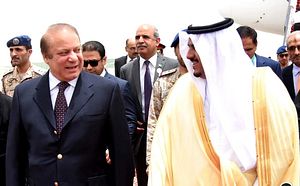Pakistani Prime Minister Nawaz Sharif’s presence at the so-called Muslim leader’s summit, which was held in Riyadh, Saudi Arabia, last week, has generally been called a fiasco. These criticisms have come mainly due to two reasons: first, because of Sharif’s inability to secure his inclusion on U.S. President Donald J. Trump’s agenda and, second, because of his failure to register Pakistan’s position as a country that has suffered greatly from terrorism and fought valiantly against it. Much of the criticism that has come in the wake of Sharif’s visit to Riyadh is unnecessary and uncalled for due to three reasons.
First, the summit, which has widely dubbed an “Arab Muslim NATO” meeting, didn’t at any stage involve issues which are critical to South Asia’s security landscape. In fact, the summit was an effort on Saudi Arabia’s part to reinforce its leadership position in the Gulf, Middle East, and the rest of the Islamic world. On the other hand, Trump’s choice of opting for Saudi Arabia as the country of his first foreign visit mainly stems from the latter’s willingness to invest billions of dollars in U.S. infrastructure. Moreover, Trump was fleeing scandal at home and was greatly interested in securing alliances abroad that could shore up his domestic and economic policies. It is important to note that of all regional states, it is Saudi Arabia that benefits most from Trump administration’s policy preferences in the Middle East, which, among other things, involves the isolation of Iran. In the grand scheme of things, the expectations that Pakistan’s representation at the summit should have extended beyond a mere presence reflects a poor understanding of a strategic situation.
Second, people highlighting Sharif’s failures have based their argument on the premise that since Trump, during his speech, mentioned “India as a terror victim state” and ignored “Pakistan’s role in combating extremism,” Pakistan had failed to achieve its objectives at the summit. Beyond optics and rhetoric, Trump’s comment considering India being a victim of terror should be viewed in the larger context of rapidly changing geopolitical and geoeconomic realities of the South Asian region. Pakistan’s growing economic closeness toward China and Russia that has also facilitated Beijing and Moscow in gaining political foothold and influence in Afghanistan and doesn’t bode well for the United States and India’s interests in the region.
It is important to note too that the United States and India have been working closely on forging a partnership to counterweight the growing role of China – a close ally of Pakistan – in the South Asian region. A week ago, India boycotted China’s ‘One Belt, One Road’ global infrastructure project while the United State, a month ago, rejected Russia’s invitation to join a peace conference on Afghanistan, which was held in Moscow. In this milieu, if Trump used the occasion to clarify his country’s position vis-à-vis India, then this should be looked at in the context of both countries bilateral relations and their emerging alliance against the China-led block, which Pakistan appears to have hedged its bets on. For instance, the Trump administration is considering converting military grants to Pakistan into loans, which is hardly a result of Trump’s visit to Saudi Arabia; rather, this is a policy change that is by and large affected by the above mentioned circumstances.
Third, the argument that Riyadh should have rescued Pakistan at the summit due to their close historic relations is absurd to begin with. While Riyadh continues to project the country’s ‘Islamic political identity’ as an essential part of its foreign policy, Saudi Arabia has long forgone its policy of favoring historic relations over its strategic interests. Particularly, since the emergence of the new leadership in Riyadh, the country has shown that it’s willing to strike military, economic, and diplomatic partnerships and deals wherever it suits its interests. Saudi Arabia recently signed number of mega economic and military pacts with India. Moreover, the country’s covert overtures toward Israel and both countries’ cooperation on containing Iran has become an open secret. Now India is a country that Pakistan considers its arch rival and Israel is a state that Pakistan doesn’t even recognize. This trend is likely to further deepen. From this perspective, it would be folly to argue that Pakistan should expect favors from Riyadh when it comes to its relations with India, the United States, or even Israel for that matter.
In essence, when it comes to the implantation of Pakistan’s foreign and security policy, the civilian government in the country has effectively no control. However, what Pakistan’s civil and military needs to learn from the experience is the craft of balancing its relations between Saudi Arabia and countries that Riyadh considers to be its nemeses. If Sharif’s attendance at the summit is to be called a fiasco then it should be called a fiasco in terms of Pakistan relations with Iran. Pakistan needs to strategically reconsider its approach when it comes to dealing with Saudi Arabia and Iran, for Islamabad cannot afford to choose one country over the other.
All in all, Prime Minister Sharif’s presence at the summit is a reminder that Pakistan needs to look inward to plug loopholes that continue to plague the country’s foreign policy choices and preferences. The eventual success or failure of the visit should be based on the changes that Pakistan may or may not introduce in its foreign policy.

































